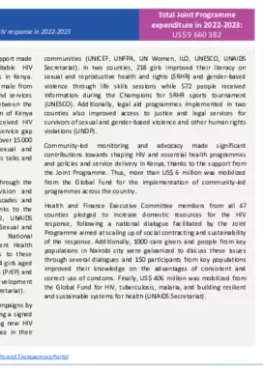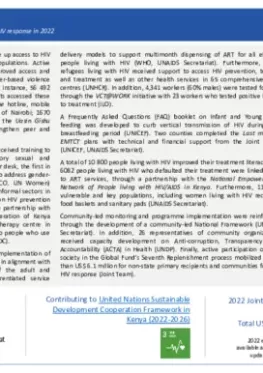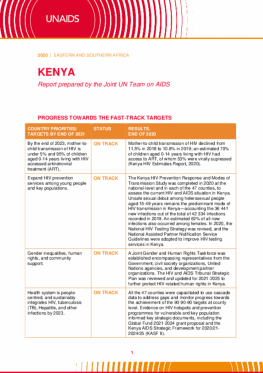|
Kenya
During the 2022-2023 biennium, the Joint Programme’s support made significant impact in strengthening access to equitable HIV prevention, testing, treatment, care and support services in Kenya. For instance, 16 223 workers who were predominantly male from informal sectors accessed HIV prevention information and services and received 28 847 condoms through a partnership between the Central Organization of Trade Unions and the Federation of Kenya Employers (ILO). More than 9000 people in prisons received HIV prevention and treatment services, further closing the service gap among this marginalized population (UNODC). In addition, over 15 000 students were sensitized on HIV prevention and sexual and reproductive health services through innovative awareness talks and sensitization programmes (UNESCO).
HIV testing and treatment services were strengthened through the development of national HIV testing guidelines, revision and optimization of the adult and paediatric treatment cascades and expansion of advanced HIV disease care package, thanks to the technical support from the Joint Programme (WHO, UNAIDS Secretariat). The newly developed National Adolescent Sexual and Reproductive Health (ASRH) policy and validated National Reproductive, Maternal, Newborn, Child, and Adolescent Health investment case are expected to further boost access to these services among vulnerable populations. In addition, 75 204 girls aged 15-19 years accessed HIV testing, pre-exposure prophylaxis (PrEP) and treatment services in 10 counties through an ASRH Development Impact Bond (DIB) service expansion initiative (UNAIDS Secretariat).
Intensive faith-based advocacy and awareness creation campaigns by the Joint Programme resulted in 78 religious leaders issuing a signed communiqué underlining their commitment to addressing new HIV infections, teenage pregnancies and gender-based violence in their communities (UNICEF, UNFPA, UN Women, ILO, UNESCO, UNAIDS Secretariat). In two counties, 218 girls improved their literacy on sexual and reproductive health and rights (SRHR) and gender-based violence through life skills sessions while 572 people received information during the Champions for SRHR sports tournament (UNESCO). Additionally, legal aid programmes implemented in two counties also improved access to justice and legal services for survivors of sexual and gender-based violence and other human rights violations (UNDP).





